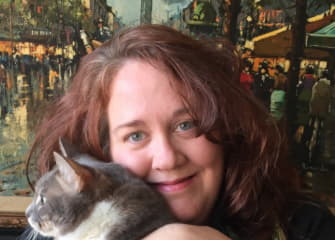
Angela Grimes
Born Free USA, a global leader in animal welfare and wildlife conservation, has named Angela Grimes the organization's CEO. Grimes joined Born Free USA in 2010 and previously served as its director of development and operations. She has been acting CEO since August 2018.
"This is a critical time for wildlife," Grimes said. "They face unprecedented pressures due to habitat loss and trade in live animals and their parts, among other threats that endanger the lives of individual animals and entire populations. In contrast, public opinion on wildlife issues has shifted. There is a growing awareness of the intrinsic value of animals and support for protecting them and ending animal cruelty. I am honored to have been chosen to lead Born Free USA's life-saving mission into the future."
Before joining Born Free USA, Grimes served as executive director and COO for Wildlife Rescue & Rehabilitation, a wildlife sanctuary and rescue center, and chorus and operations manager for the Chicago Symphony Orchestra.
Grimes currently serves on the national board of directors for EarthShare, a federation of leading environmental organizations. She has also served as board chair of Mindy's Memory Primate Sanctuary, EarthShare of Texas, and Chicago Chorale as well as vice president of the Kappa Alpha Theta Fraternity Housing Corporation.
"Angela has the experience and compassion to take Born Free USA to the next level," said Born Free President Will Travers. "The experience to tackle the many legal challenges that threaten to undermine the protection of native and non-native species, to stand fast against the erosion of regulations, and to sustain and build the alliances necessary to be truly effective. The compassion to realize that every single animal matters, from the more than 500 primates in our Texas Primate Sanctuary, to the millions of animals who languish in roadside zoos and circuses or are held by private individuals as 'pets,' to the wild animals whose lives are threatened by persecution, trapping and trophy hunting. As far as Angela and Born Free USA are concerned, no one should be left behind. With her tenure as Born Free USA's acting CEO, Angela's proven that she's the right person to lead this organization as we work to deliver a better future for ourselves and the animals with whom we share this fragile planet."
For more information about Born Free USA, visit https://www.bornfreeusa.org.
About Born Free USA
We work tirelessly to ensure that all wild animals, whether living in captivity or in the wild, are treated with compassion and respect and are able to live their lives according to their needs. Not only does our conservation work occur in communities, classrooms, courtrooms, and the halls of Congress, we also operate the largest primate sanctuary in the United States. As a leading wildlife charity, we oppose the exploitation of wild animals in captivity and campaign to keep them where they belong – in the wild.
We promote Compassionate Conservation to enhance the survival of threatened species in the wild and protect natural habitats while respecting the needs and safeguarding the welfare of individual animals.
We seek to have a positive impact on animals in the wild and protect their ecosystems in perpetuity, for their own intrinsic value and for the critical roles they play within the natural world.
Born Free USA was inspired by Virginia McKenna and her late husband Bill Travers, who, along with their son, Will, founded The Born Free Foundation (UK) in 1984. Their experience in Kenya filming the classic 1966 Academy Award®-winning film Born Free, the story of Joy and George Adamson's fight to successfully return Elsa the lioness to a wild and free life, launched the couple's "compassionate conservation" movement, aimed at keeping wildlife in the wild. This movement continues to motivate millions of followers and activists across the globe.
Located in south Texas, Born Free USA's Primate Sanctuary provides a permanent home for more than 500 primates retired from research facilities or rescued from inhumane conditions at zoos and private ownership. These primates have often endured a lifetime of abuse, neglect, and cruelty, and many come to the sanctuary with special physical and emotional needs, requiring extensive care and services.


































